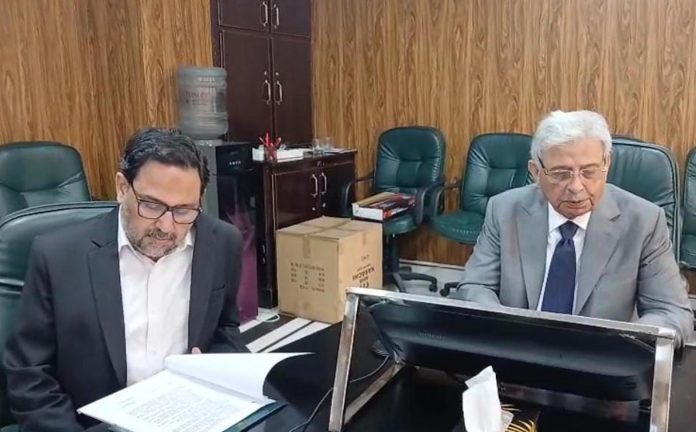Chairman Senate Lauds HEC’s NOP for universities faculty, staff
Tanveer chairs meeting to discuss sugar availability, future strategy

Govt reaffirms push for quality in legal education, pledges action against unapproved law programs
UN rights office calls for talks as Israel-Iran attacks escalate
UNITED NATIONS, Jun 18 (APP): As the Iran-Israel crisis continued into a sixth day on Wednesday, the UN deputy human rights chief Nada Al-Nashif called for urgent talks to end the ongoing missile attacks between Tehran and Tel-Aviv.
Israel began targeting nuclear and military sites across Iran last Friday, prompting a barrage of Iranian retaliatory strikes on Israeli cities.
“The UN human rights office urges de-escalation and urgent diplomatic negotiations to end these attacks and find a way forward,” said Ms. Al-Nashif. “We are following closely and are aware of reports that many thousands of residents are fleeing parts of the capital, Tehran, as a result of warnings covering broad areas.”
Latest reports from the region indicate that more than 200 people have been killed in Iran and 24 in Israel to date. The violence continued unabated overnight in both countries.
Addressing the Human Rights Council in Geneva at a scheduled meeting to discuss Iran’s rights record, the Deputy High Commissioner highlighted serious concerns that populated areas have been hit in the escalation.
“It is imperative that both sides fully respect international law, in particular by ensuring the protection of civilians in densely populated areas and of civilian objects,” she said. “We urge all those with influence to engage in negotiation as a matter of priority.”
In a related development, the UN-backed nuclear watchdog said on Wednesday that two Iranian centrifuge production facilities had suffered major damage after being targeted.
“The TESA Karaj workshop and the Tehran Research Centre, were hit,” it said in an update. “At the Tehran site, one building was hit where advanced centrifuge rotors were manufactured and tested.
At Karaj, two buildings were destroyed where different centrifuge components were manufactured,” said the International Atomic Energy Agency (IAEA).
Speaking at the Human Rights Council after the Deputy High Commissioner, Iran’s Permanent Representative, Ambassador Ali Bahreini, condemned the Israeli strikes:
“There has been no violation worse than [the] 13 June act of aggression against Iran,” he said, pointing to “continuous blind attacks on residential areas, bombardment of vital supplies, explosion of drinking water resources and reckless strikes on nuclear facilities are immediately impacting the civilians and people of Iran.”
Such “deliberate targeting” of his country’s nuclear facilities risked exposing local communities to a “possible hazardous leak”, the Iranian ambassador added. “This is not an act of war against our country, it is war against humanity.”
In a short statement to the Council from which Israel announced its withdrawal earlier this year, Bahreini called for accountability and international condemnation of the Israeli attacks.
“This impunity must come to [an] end,” he said. “Israel activities are not just against one or two countries. It is acting against all humanity and their actions target all human rights.”
PM Shehbaz for global standards in vocational training to boost overseas employment
ISSI & CLAS host seminar on “Weaponizing Water: The Indus Waters Treaty and Future of Regional Stability”
Religious affairs ministry set to launch early registration for Hajj 2026 pilgrims
By Rehan Khan
ISLAMABAD, June 18 (APP): The Ministry of Religious Affairs and Interfaith Harmony is finalizing preparations to begin early registration for Hajj 2026 within the next few days, official sources confirmed on Wednesday.
In a move for streamlining the pilgrimage process, the ministry has made advance registration mandatory for all intending pilgrims under both the government and private Hajj schemes.
According to sources, applicants will be required to submit a specific amount as a token money along with their registration forms. This amount will be adjusted against the total cost of the Hajj package at a later stage. Only those who complete the registration process will be considered eligible for Hajj 2026, sources added. Registration will be facilitated through designated banks across the country.
After completing registration, pilgrims will have the option to choose between the government-run or private Hajj schemes.
Sources also revealed that individuals who missed out on Hajj 2025 under the private scheme will also be required to register afresh to be eligible for the Hajj 2026.
The initiative comes in response to a directive from Saudi Arabia’s Ministry of Hajj and Umrah, which has signaled the commencement of preparations for Hajj 2026. “The registration data will be shared with the Saudi authorities, who will use it to allocate Pakistan’s official Hajj quota,” an official said.
A formal advertisement outlining the registration process and requirements is expected to be issued within the next a couple of days, marking the beginning of the nationwide campaign.









